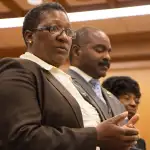A new report on Black women lawmakers shows their continued underrepresentation in state legislatures, including in states where a substantial number of Black women reside.
The report shows that of the 7,383 people who serve as lawmakers in statehouses, just 356 — or 4.8 percent — are Black women. The report uses data as of March 2021 and was released Monday by the National Organization of Black Elected Legislative Women (NOBEL Women) and the State Innovation Exchange.
It’s the most Black women to ever serve in America’s statehouses, which are still primarily made up of White men. But even the recent gains are woefully inadequate, said Krystal Leaphart, operations and policy associate for NOBEL Women. She said the underrepresentation affects what policy proposals actually advance in areas including health care, the economy and issues that intersect with social justice.
“We expect legislators to help those at the margins,” Leaphart said. “If the legislators who are there don’t have the experience to understand how these issues show up for us, there’s no way they can adequately legislate to fix them. The voices of the Black women who are there in legislatures are essential to help fix the problem.”
Del. Lashrecse Aird is one of them. First elected to the Virginia statehouse in 2015, the Democratic lawmaker has advanced a resolution to declare racism a public health crisis and a bill to ban public universities from using criminal history questions on admissions applications. Aird has also advocated for infant mortality and pregnancy-related death prevention efforts.
Aird said she has seen White male lawmakers express surprise that racial inequality exists in areas like traffic stops.
“If you don’t have the lived experience, it doesn’t matter how aware you are. It doesn’t matter how much education you have, it is not a part of your being and thereby you really don’t understand,” she said. “And oftentimes you’re not representing a community where this is part of their day-to-day life.”
Eight states, all with small Black populations, have no Black women lawmakers: Arizona, Hawaii, Idaho, Montana, Nebraska, North Dakota, South Dakota and Vermont. In 2018, Vermont’s sole Black woman lawmaker at the time resigned after she faced repeated racial harassment.
But Black women are also underrepresented in states where they make up a larger proportion of the population:
- In Mississippi, Black women make up just over 19.3 percent of the population but about 7.4 percent of the state legislature.
- In Louisiana, Black women make up just over 16.8 percent of the population but about 5.5 percent of the state legislature.
- In South Carolina, Black women make up just over 13.3 percent of the population but about 7.6 percent of the state legislature.
- In Tennessee, Black women make up just over 8.6 percent of the population but about 4.5 percent of the state legislature.
Georgia has the most Black women, at 39, or 16.2 percent of the legislature, reflective of the state’s population.
Emilia Sykes, a Democrat and Ohio House minority leader, described microaggressions during her time in office. After she was elected in 2014, she said, she was repeatedly stopped by Capitol security, even while wearing a lapel pin marking her as a lawmaker. Sykes said she and the few other Black women lawmakers were sometimes called the “diva caucus” as they worked together on policy. She never saw it as a compliment, and instead as a way to make it seem like they were difficult to work with. The women decided to get matching T-shirts in an effort to reclaim the description.
Sykes said she has also faced threats of violence, including against her and her father, who is also a state lawmaker.
“There’s still some apprehension about having women and Black women in particular in these bastions of power because state legislators for sure have way more power than people really give us credit for,” she said. “They know when we come in there we’re talking about paid family leave and an increase in the minimum wage … we’re talking about all things that make everybody’s lives better, but for people who’ve been operating under a system that works when you oppress others, it is a threat. And so they challenge us. And they make the job so much more difficult.”
Statehouses serve as a pipeline for Black women to run for higher office. Nikema Williams, now a congresswoman from Georgia, started in the statehouse. Before Karen Bass became a congresswoman for the state of California, she was a state lawmaker who also became the first Black woman to serve as speaker of any statehouse.
Of the 142 women serving in the current Congress, 23 are Black, according to the Center for American Women and Politics at Rutgers University. Overall, 50, or 35.2 percent, are women of color. There are currently no Black women in the U.S. Senate.
Lauren Bealore, democracy director for State Innovation Exchange, emphasized the importance of elevating Black women in statehouses.
“The more Black women that you have across state legislatures and leading in state legislatures, the more representation that their communities and districts are seeing as well, which in turn creates a pipeline for more Black women to see themselves as legislators,” she said.
There has been a rise in Black women state lawmakers in recent years, according to a report released in 2019 by Higher Heights and CAWP. A February 2021 report from the Reflective Democracy Campaign shows from 2016 to 2020, Black women’s representation in state legislatures increased at a rate of 28 percent, from 3.3 percent to 4.3 percent.
Bealore said there are solutions to address the inequities reflected in the latest report. Organizations that fund legislative races, as well as small-dollar donors, must support Black women candidates. And state lawmakers themselves have to support current Black women who seek leadership positions within statehouses.
Bealore said the report is a call to action.
“It’s really a call to all who believe that we need a functioning representative democracy in this country,” she said. “Without proper awareness of Black women seeking leadership, investments in Black women in office, and then the commitment to support those Black women, we’ll just continue to be underrepresented in government.”






